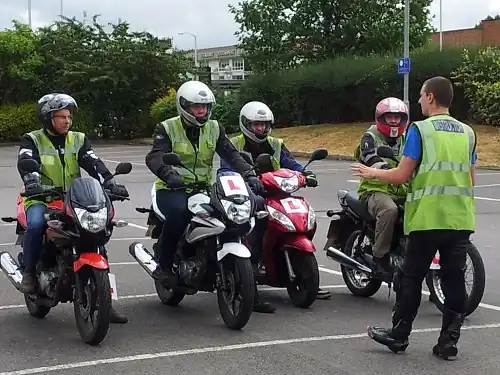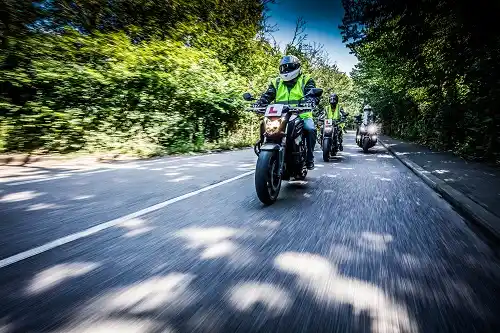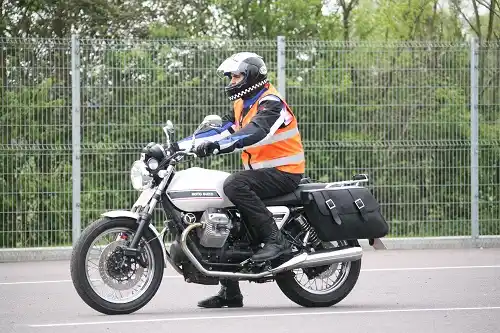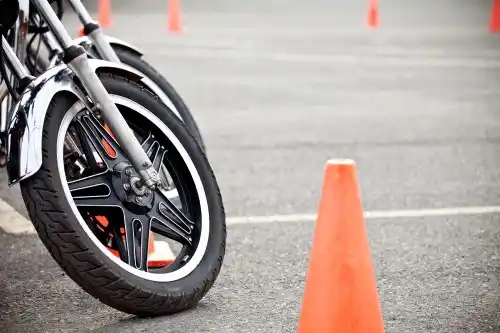motorcycle training with Moto Technique Manchester
Units 1 & 2 Millgate, Dantzic Street, Manchester, Greater Manchester, M4 4JW
Website: www.moto-technique.co.uk
Facebook: https://www.facebook.com/pg/MotoTechnique
Indoor classroom
Bike hire included
Helmet hire included
There are 4 main types of full motorcycle licence issued by the DVSA. The first three (AM, A1 and A2 motorcycle licences) have restrictions on the type of moped or motorcycle you can ride, the fourth (the full A motorcycle licence) has no
restrictions. The minimum age to take this test is 17. According to the DVSA website it will allow you to ride a "Light motorcycle up to 11 kW (and
a power-to-weight ratio not more than 0.1 kW per kg) and 125 cc". This means it's up to a 125 cc motorcycle with some restrictions to make sure it cannot accelerate too fast - a really good idea when you are new to riding a motorbike! Requirements to take the A1 motorcycle test - You must have a UK provisional or full driving licence, a valid theory test certificate and
a valid CBT certificate. Once you have taken this test you will not have to keep renewing your CBT certificate every 2 years, you can ride on motorways and you can take a pillion
passenger on the back of your motorbike. For this licence you need to be at least 19 years of age, have completed your CBT or have had an A1 licence for at least 2 years. As with the A1 test you also need to have a UK provisional or full driving licence and a valid theory test certificate . The main benefit of getting an A2 licence is you can ride a more powerful motorcycle. The law states a "standard motorcycle up to 35 kW (and a
power-to-weight ratio not more than 0.2 kW per kg)". So it's a more powerful bike, but still not completely un-restricted. To find A2 legal motorbikes you are best visiting your local motorcycle dealer and asking them to show you the A2 legal
bikes, as otherwise it's very difficult to work out just looking at the tech specs. This is the licence that allows you to ride almost any motorcycle without restrictions, so it's the ultimate motorcycle licence. No limits on power outputs or power per kg or engine size! It is also called a 'DAS' licence as it can
be obtained from the 'Direct AccesS' route. There are two ways you can get this licence: 1) If you are 24 or over you can take the tests for an A licence. You must also have a UK provisional or full driving licence, a valid theory test certificate and
a valid CBT certificate. 2) If you are at least 21 years of age and you have held an A2 category licence for at least 2 years. This is sometimes referred to as the 'progressive access' route as you progress from one licence to another. When taking the test the biggest difference is that you have to use a bigger, more powerful motorcycle. It will have a power of at least 40kw and an engine cc of at least 595 cc. Your local training school will make sure you have the right size
bike for your test. There is also a flowchart (click here) that the DVLA have produced that shows these different licences and how to obtain them. To get more detailed guidance on what licence is right for you then talk to your local motorcycle training school. You can search for them here and they are qualified to speak to you on the right type of training for you.
CBT is only part of motorcycle training. To get your full motorcycle licence you need to pass the following tests: These are completed at your local DVSA theory test centre. The theory test is a 57 minute test taken under exam conditions. It will check that you have a thorough knowledge of
the Highway Code and check that you understand the theory of riding a motorcycle. The hazard perception test takes about 15 minutes and is taken straight after the theoury test. You
will be shown a set of videos that show road situations from a motorcycle riders point of view. As you are watching the videos you have to indicate where you think a possible hazard is developing. The sooner you identify a hazard the higher the
score you will get. There are some useful resources for helping you pass your motorcycle theory test. Firstly is the DVSA video on passing your theory test, just click this link. There is also a video to help with your hazard perception test here. If you'd like to practice the theory test then click this link,
and there is also a practice for the hazard percption test here. This is the training that takes a day to complete, sometimes longer and contains a mixture of classroom theory, off road practice and on road riding. It is completed at a motorcycle training school, you can find your closest motorcycle training school by clicking here.
You can read up about all the details of compulsory basic training here. You can view a video from the DVSA all about the module 1 test here. This test normally takes about 20 minutes and is taken in a completely off road setting. You will be taken to a large tarmac area where you will need to demonstrate your ability to carry out the following manoeuvres: Once you have completed the test you will be told if you have passed or failed. You must pass the module 1 test before taking the module 2 test. Therefore be careful when you book, as if your module 2 test is too soon after your module 1 test and you fail the module 1 you will not be able to take your module 2 test. You can view a video from the DVSA all about the module 2 test here. This test involves riding on road and takes about 40 minutes in total. You will need to carry out the following things: You must bring your module 1 pass certificate to the module 2 test, you cannot take the module 2 test without a module 1 pass certificate. The eyesight check involves reading a number plate from 20 metres away. 'Show me, tell me' is where you will be asked 2 vehicle safety questions from this list. As well as answering you must show the examiner what you are talking about by demonstrating it on the motorcycle. With the road ride the examiner will give you instructions through
a radio link and will normally follow you on a motorcycle to observe your riding. The last 10 minutes will be independent riding which is designed to assess your ability to ride safely while making your own decisions. After telling you a set of
directions you will be expected to carry them out safely and independently. What are the different types of motorcycle licence I can get in Manchester?

The AM restricted moped licence
The A1 restricted motorcycle licence

The A2 restricted motorcycle licence
The full A motorcycle licence, or DAS licence.
What are the main parts of a motorcycle test?

Theory and hazard perception tests
Compulsory basic training - CBT
The module 1 (mod 1) test

The module 2 (mod 2) test